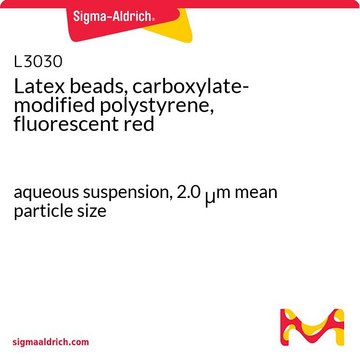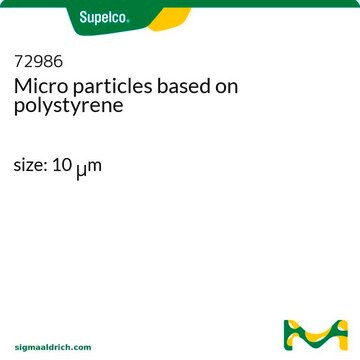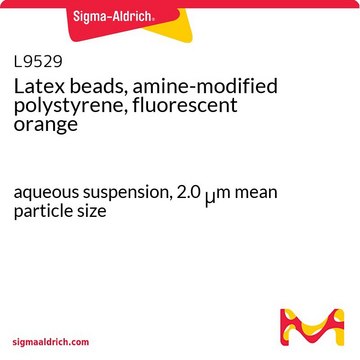Wszystkie zdjęcia(1)
Key Documents
LB30
Latex beads, polystyrene
3.0 μm mean particle size
Synonim(y):
Latex Beads, Latex Microspheres
Zaloguj sięWyświetlanie cen organizacyjnych i kontraktowych
About This Item
Polecane produkty
Postać
aqueous suspension
skład
Solids, 10%
opakowanie
pack of 1 mL
pack of 15 mL
pack of 2 mL
średnia wielkość cząstek
3.0 μm
Szukasz podobnych produktów? Odwiedź Przewodnik dotyczący porównywania produktów
Opis ogólny
Latex beads are utilized in applications including electron microscopy and cell counter calibration, antibody-mediated agglutination diagnostics, phagocytosis experiments, and many others. The most popular use of latex beads is, particularly in latex agglutination tests. This method allows the detection of minute amounts of antigens or antibodies in serum, urine, and cerebrospinal fluids. It is also used in phagocytosis research. The beads are supplied as aqueous suspensions and are composed mainly of polymer particles (30%) and water, (>69.0%) with small amounts of surfactant, (0.1–0.5%) sodium bicarbonate, and potassium sulfate (inorganic salts – 0.2%). This product is for R&D use only, not for drug, household, or other uses. For more information, please refer the Product Information Sheet.
This page may contain text that has been machine translated.
Kod klasy składowania
12 - Non Combustible Liquids
Klasa zagrożenia wodnego (WGK)
WGK 3
Temperatura zapłonu (°F)
Not applicable
Temperatura zapłonu (°C)
Not applicable
Certyfikaty analizy (CoA)
Poszukaj Certyfikaty analizy (CoA), wpisując numer partii/serii produktów. Numery serii i partii można znaleźć na etykiecie produktu po słowach „seria” lub „partia”.
Masz już ten produkt?
Dokumenty związane z niedawno zakupionymi produktami zostały zamieszczone w Bibliotece dokumentów.
Klienci oglądali również te produkty
Florian Oehme et al.
RNA biology, 16(10), 1339-1345 (2019-06-30)
Molecular risk stratification of colorectal cancer can improve patient outcome. A panel of lncRNAs (H19, HOTTIP, HULC and MALAT1) derived from serum exosomes of patients with non-metastatic CRC and healthy donors was analyzed. Exosomes from healthy donors carried significantly more
Dapeng Li et al.
Oncoimmunology, 1(5), 687-693 (2012-08-31)
Tumor cells expressing TLRs is generally recognized to mediate tumor inflammation. However, whether and how tumor TLR signaling pathways negatively regulate tumor inflammation remains unclear. In this report, we find that TLR4 signaling of H22 hepatocarcinoma tumor cells is transduced
Catherine M Buckley et al.
PLoS pathogens, 15(2), e1007551-e1007551 (2019-02-08)
By engulfing potentially harmful microbes, professional phagocytes are continually at risk from intracellular pathogens. To avoid becoming infected, the host must kill pathogens in the phagosome before they can escape or establish a survival niche. Here, we analyse the role
Nichaluk Leartprapun et al.
Nature communications, 9(1), 2079-2079 (2018-05-29)
Optical tweezers are an invaluable tool for non-contact trapping and micro-manipulation, but their ability to facilitate high-throughput volumetric microrheology of biological samples for mechanobiology research is limited by the precise alignment associated with the excitation and detection of individual bead
Birgit A Steppich et al.
Thrombosis journal, 7, 11-11 (2009-07-03)
Tissue factor (TF) contributes to thrombosis following plaque disruption in acute coronary syndromes (ACS). Aim of the study was to investigate the impact of plasma TF activity on prognosis in patients with ACS. One-hundred seventy-four patients with unstable Angina pectoris
Nasz zespół naukowców ma doświadczenie we wszystkich obszarach badań, w tym w naukach przyrodniczych, materiałoznawstwie, syntezie chemicznej, chromatografii, analityce i wielu innych dziedzinach.
Skontaktuj się z zespołem ds. pomocy technicznej









